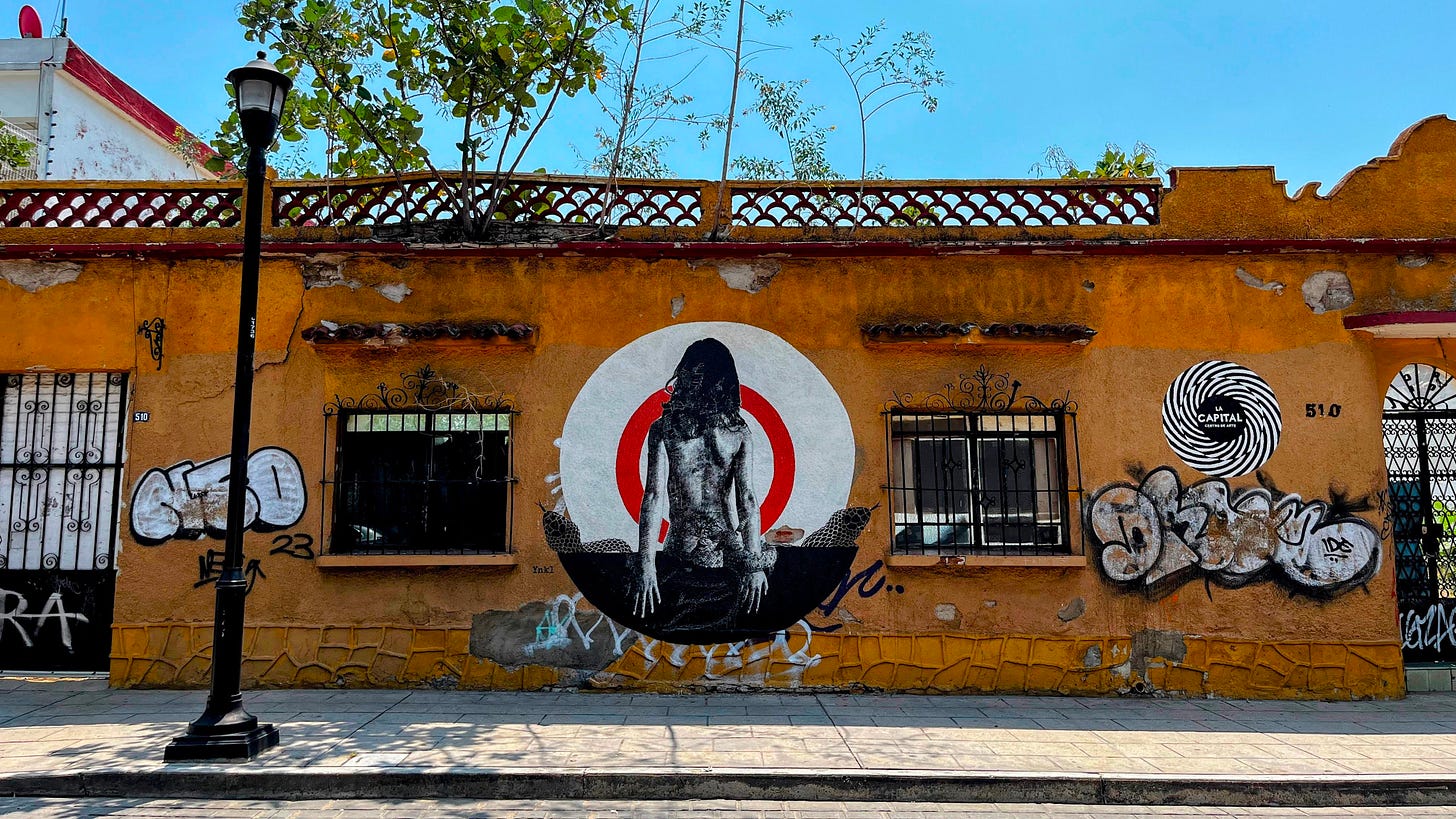Four days without phones
Trad wives, fake texts, early influencers, AI education and the Roman empire
On August 30 — technically the 31st, just a beat after 12 a.m. — Jason and I were walking back to our hotel from a bar in Oaxaca when two men leapt up after us from a dark doorstep. The interaction was wordless, almost choreographed: I’m not sure it lasted more than half a minute. But it left us without money or credit cards or phones for the last four days of a week-long trip — which is to say it left us without money or credit cards or cameras or boarding passes or maps or a means of telling time or translating the language.1
Do *you* remember the last time you went days without a smartphone? I didn’t, and I didn’t think it would prove very hard. I always turn on airplane mode when we leave the country, anyway. (No need for both of us to pay that extra data charge!)
But the phone operates like an extension of your person. I’d outsourced some basic instincts to it. For those four days without our phones, we never knew the time. We had no feel for the light or the pace of passing minutes.
The hotel gave us a paper map. (“In eight years, we’ve never had anyone mugged!”) We fitted and started around the city center, stopping to unfold it at frequent intervals.
Even when we got our bearings, we didn’t know the “best” places — that overlay of Google ratings and social geotags went dark. Instead, we found ourselves newly reliant on the benevolence of random, in-person strangers: for suggestions, for directions, for anniversary photos they took on their phones and promised to send us (… but alas, two weeks later, still have not!!).
It was hard, honestly! Or if not hard, then persistently uncomfortable — the kind of pleasant, mild discomfort that’s easily romanticized once it’s over. On the flight back home, I vowed to Jason I’d switch to a flip phone. Be present. Disconnect.
But that lasted two days: I am weak-willed. And also, not a masochist.
If you read anything this weekend
Note: I usually only share links that are <8 days old, but am allowing myself some slightly staler links on account of going on vacation, getting mugged, etc etc. Next week we’ll be more current.
“The Decomposition of Rotten Tomatoes,” by Lane Brown for Vulture. It does not surprise me in the slightest that sleazy PR firms and small-time bloggers have found ways to game Rotten Tomatoes … but it surprised me *a lot* to learn the site’s (self-evidently??) iffy ratings skew film distribution and box office performance.
“My So-Called #TradWife Life,” by Anne Helen Petersen for Elle. In all its many forms, from straight-up Biblical fundamentalism to mild ‘50s cosplay, “trad wife” culture relies on the bedrock notion that men should subsume their partners’ identities. But this regressive fantasy wouldn’t be so seductive if being a woman wasn’t so difficult. “To give up control can feel very much like achieving it.”
“She Invented Being an Influencer — And Was Vilified for It,” by Taylor Lorenz for Rolling Stone. The first excerpt from Taylor Lorenz’s first book, out October 3, reexamines the early-aughts legacy of Julia Allison: “a person famous for being famous,” in the long-ago words of Wired. I’m glad we’re calling out the misogyny of this period, but … it definitely looks like Allison got the last laugh? I don’t see many former Gawker writers swanning around Spain in $900 dresses.
“The Albanian Town that TikTok Emptied,” by Isobel Cockerell for Coda. Thousands of young Albanians have migrated to the United Kingdom, many drawn by images of wealth and luxury they saw on TikTok. Reality, of course, doesn’t often match up. (I have to imagine this story’s also playing out at the U.S./Mexico border.)
“A Literary History of Fake Texts in Apple's Marketing Materials,” by Max Read for Read Max. “There is still [one] good reason to attend to Apple’s marketing extravaganzas: … the mocked-up texts and emails Apple puts together to demonstrate new messaging features.”
👉 ICYMI: The most-clicked link from the last newsletter concerned leaked emails from Taylor Swift’s Eras tour.
Classified ads
“A beautiful little magazine via email.” Dense Discovery presents thoughtfully curated discoveries in design, tech, sustainability and urbanism — free, every Tuesday. Join 43,000 readers and receive one weekly email that helps you feel inspired, be productive and think critically. URL to link to:
Want to share your newsletter, podcast, job post or product with us? Click here to book a classified ad in the next edition.
Postscripts
Teachers are going all-in on AI. Online, everybody’s a girl. Big Food pays off TikTok dietitians. The rise of weather influencers and influencer tours. The men are not okay, part 301: penis enlargement subreddits and obsessions with Rome. (Seriously — ask any mixed-gender group about the Rome thing. A fascinating phenomenon.)
Who deserves to eat at Noma? How do birthday divas still have friends? AI-generated Coke. New emoji drop. Every possible license plate in the U.S. Last, and absolutely least, the past week in shameless scams: fake aliens, “anti-glasses” wellness and Anna Delvey, at it again.
That’s it for this week! Until the next one. Warmest virtual regards.
— Caitlin
To be clear — we are FINE!! Totally fine. I still highly recommend Oaxaca. I also recommend not carrying all your credit cards on your person at one time and never forgetting your iCloud password.



